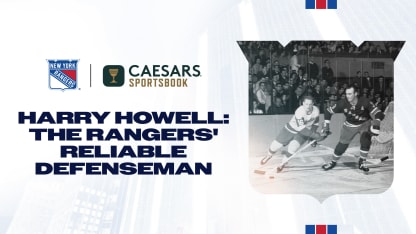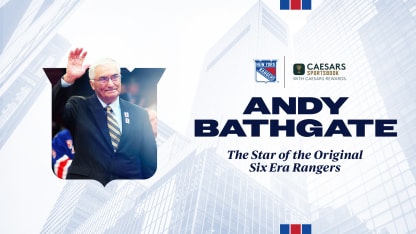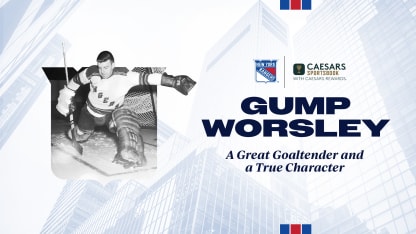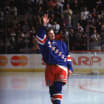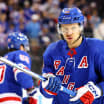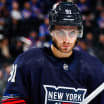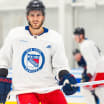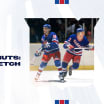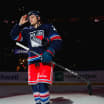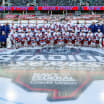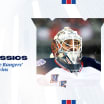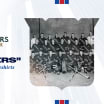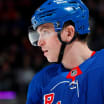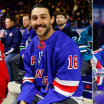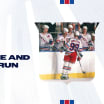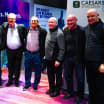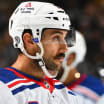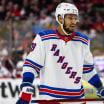Hall of Famer became franchise’s all-time leader in games played in distinguished 17-season career with Blueshirts
It was 62 years ago today – January 6, 1962 – that the Rangers faced the Montreal Canadiens in a game in Montreal, just as they will tonight. On that night over six decades ago, Harry Howell played in his 650th career game with the Rangers and became the franchise’s all-time leader in games played, breaking the record that was held by Ott Heller.
It’s a record he still holds 62 years later. Howell, who played in 1,160 career games with the Blueshirts and missed only 40 of the 1,200 games that the team played during his 17 seasons with the franchise (1952-53 – 1968-69), truly was the team’s “Old Reliable” during his tenure.
Affectionately known as either “Old Reliable” or “Harry the Horse”, Howell was born in Hamilton, Ontario in December of 1932. As a teenager, he was signed by the Rangers and joined the Guelph Biltmore Mad Hatters (known as the Biltmores), which was the junior team the Blueshirts’ sponsored in the Ontario Hockey Association (now the Ontario Hockey League).
Howell was one of the players who became known as the “Guelph Gang” – eight players who were part of the 1951-52 Biltmores that ultimately played for the Rangers and in the NHL. In addition to Howell, Andy Bathgate, Dean Prentice, Ron Murphy, Lou Fontinato, Ron Stewart, Aldo Guidolin, and Bill McCreary all helped Guelph win the Memorial Cup that season.
Shortly after the start of the 1952-53 season, Howell was among several Guelph players – including Bathgate – who were called up by the Rangers as a result of injuries and three losses to begin the season. Howell and Bathgate both made their NHL debuts on October 18, 1952 at Maple Leaf Gardens against Toronto; ironically, it was Howell, and not Bathgate, who scored his first career NHL goal that night, beating future Hall of Fame goaltender Harry Lumley.
When Howell was first called up, the 19-year-old defenseman expected that he would only be with the Rangers for a few games and then would return to Guelph. However, he remained with the Blueshirts for the remainder of the season and the 16 seasons that followed after that.
Prior to the start of his fourth season with the Rangers in 1955-56, Howell was named the team’s captain. At 22 years old, he was the youngest captain in franchise history (Dave Maloney would later hold that distinction). Looking back years later, Howell said that it was a role that probably should have been held by someone with more experience. Even though the Rangers made the playoffs in each of his two seasons as the team’s captain, Howell’s play wasn’t as strong as he felt it could be. Following the 1956-57 season, he relinquished the captaincy, and he admittedly said that his play improved as a result.
While Howell’s improved play in the years that followed could partially be attributed to not wearing the ‘C’ on his jersey, he also was learning how best to play his position, and what his strengths were. Early in his Rangers tenure, Blueshirts fans expected Howell to be an intimidating, imposing physical presence that could punish the other team’s best forwards in front of the net or in the corners.
Howell, however, was not that type of defenseman. His biggest strength was his hockey IQ, which allowed him to more often than not be in the best position possible in the defensive zone, and make a good first pass out of his zone to spring an attack. As he grew into that type of defenseman, he became an invaluable member of the Rangers, and Rangers fans grew to realize how valuable he was.
Howell’s leadership abilities and calm demeanor – both on the ice and off the ice – did not go unnoticed by his coaches and teammates. When Howell was on the verge of breaking the franchise’s all-time games played record, Doug Harvey – who was the Rangers’ player-coach and a seven-time winner of the Norris Trophy as the NHL’s Best Defenseman (he won the award for the seventh time in 1961-62) – said that Howell “certainly rates all-star consideration.” For the majority of his career, Howell would be paired with either the Rangers’ young defensemen and/or physical defensemen, as his coaches knew that he would be the right defense partner to teach players the proper way to defend, and that if a physical defenseman was going to jump up to make a hit, Howell would always be in the right position to cover for him.
Following the 1964-65 season, Emile Francis named Howell and teammate Don Marshall as assistant coaches, even though both of them were still active players. It was the first time in franchise history that the team had an assistant coach.
“Harry could do anything on the ice,” Francis said years after Howell’s career had ended. He could play any way you wanted. When I coached him, I had him on the power play, killing penalties, and averaging more than 30 minutes a game at times.”
The 1966-67 season proved to be a special one for Howell. First, he played in his 1,000th career NHL game on January 21, 1967 at Boston, and four nights later back at MSG, the Rangers held “Harry Howell Night”. The event marked the first time that the Blueshirts had a ceremony to honor an active player. Howell also won the Norris Trophy that season, as he established career-highs with 12 goals and 40 points while continuing to play at a high level in his own zone.
In his 17 seasons with the Rangers, Howell won every team award that was possible to win during his tenure. He was named the team’s Most Valuable Player in 1963-64, received the Players’ Player Award twice (1964-65 and 1966-67), and was the winner of the Frank Boucher Trophy (awarded to the Ranger who was considered the most popular player on and off the ice, as chosen by members of the Rangers Fan Club) in three consecutive seasons from 1964-65 through 1966-67.
Howell was inducted into the Hockey Hall of Fame in 1979, and on February 22, 2009, his No. 3 jersey was retired alongside Bathgate’s No. 9 jersey in a pre-game ceremony.
The Rangers have had several outstanding defenseman throughout their storied history. Harry Howell ranks among the best to play the position for the Blueshirts.

